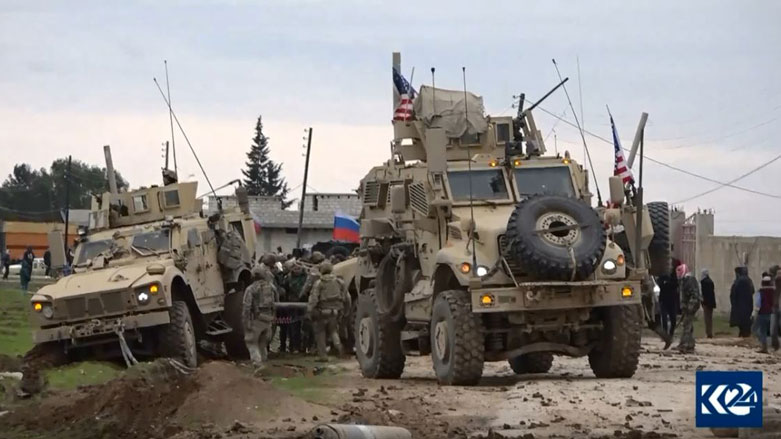US forces return fire in north Syrian pro-Assad village; 1 militant killed

ERBIL (Kurdistan 24) – A convoy of the US-led anti-Islamic State coalition on Wednesday came under fire in a pro-Damascus village outside the northern Syrian city of Qamishli in a standoff that eventually included Russian soldiers from a nearby base and led to one Syrian death.
In video footage posted online, villagers and members of the pro-Syrian government National Defense Forces (NDF) at a checkpoint in Khirbat Amo can be seen attempting to block the patrol, which included US troops.
“After being fired upon by 5-10 militia members, US forces returned fire in self-defense and killed an adult male combatant,” Col. Myles Caggins, coalition spokesperson, told Kurdistan 24.
Caggins said in a public statement that the return fire came only after “a series of warnings and de-escalation attempts,” adding that “the situation was de-escalated and is under investigation. The Coalition patrol returned to the base.”
He later confirmed to Kurdistan 24 that no US soldiers had been significantly injured in the small arms attack, but that one “had a minor scratch while operating equipment. The Soldier is back at work.”
According to the Syrian Observatory for Human Rights (SOHR), it is unclear whether the individual killed was a “civilian or a regime-backed militiaman.”
The Guardian reported, “At one point in the standoff, a Russian army convoy also arrived at the scene in an apparent attempt to mediate the rare confrontation involving US and Syrian fighters.” The Russian defense ministry later announced that “a conflict took place between US troops and the local population” and that the arrival of Russian troops at the scene had made it “possible to prevent further escalation of the conflict”.
Following the incident, locals saw US jets flying overhead in an apparent show of force.
“Their planes were in the sky and their tanks on the ground,” one taxi driver from the village complained during an interview with Kurdistan 24.
“What are they doing in this peaceful area which has 7-8 schools?” he asked. “Someone was shot in the neck. The people attacked the US forces, and the [Syrian] army did not allow them to do so.”
The village is inhabited by members of the Al-Ghanamah tribe, officially part of the Syrian government’s al-Tay tribal federation. There are around 20,000 members of the tribe settled around the suburbs of Qamishli, according to a Jamestown Foundation article written by Syria expert Nicholas Heras.
Syrian British academic Haian Dukhan and expert on Syrian tribes told Kurdistan 24 that the Al-Ghanamah clan is represented by the Syrian MP Hassan Hazma al-Sloumi in parliament.
“The Syrian regime uses tribal membership as a way to create patronage networks with certain tribes. The regime has always used Arab tribes as a way to counter-balance the Kurds,” he told Kurdistan 24.
“Hafez al-Assad settled thousands of Arab tribesmen from Raqqa in al-Hassekeh in the 1970s as part of the Arab belt project and later his son Bashar used ties with the Arab tribes to suppress the Kurdish uprising in 2004.”
However, this specific tribe was not settled in the Qamishli area in the 1970s. In an earlier interview for the Arab Tribes website last year, al-Sloumi said he rejected “any separatist Kurdish attempts.”
The Al-Ghanamah tribe is known for being particularly opposed to Kurdish groups gaining local power and influence.
Leith Aboufadel, founder of Al-Masdar News, told Kurdistan 24, “They are pro-government and make up much of the NDF and Ba’ath Brigades in southern Qamishli.”
In some cases, members of local tribes in the Hasaka province have joined Islamist rebels including the Al-Qaida linked Jabhat al-Nusra or Syrian government forces.
“We have seen in the past, mostly in Al-Hasakah, some strong anti-Kurdish sentiments from some tribes and townspeople,” Aboufadel added.
The incident is not the first between the Syrian government and the US-led Coalition. In December, a Syrian government checkpoint near Qamishli’s airport stopped a US military envoy, North Press reported at the time.
Aboufadel did not rule out the possibility that something similar could likely happen again.
“In regards to future incidents, it is possible, especially with what we have seen over the last few weeks. Tensions are definitely at high.”
Editing by John J. Catherine
(Additional reporting by Lava Asaad from Qamishli)
